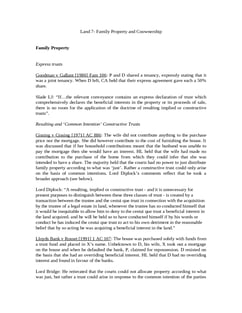Cityland Property v Dabrah [1968] Ch 166
Judgement for the case Cityland Property v Dabrah
Table Of Contents
Defendant bought a house from Plaintiff, with some of the balance to be paid by a loan from Plaintiff to Defendant, which Defendant was to repay over time in return for granting a mortgage interest to Plaintiff.
The terms were that if Defendant defaulted, a premium would be added to the loan, bringing the overall rate of interest to 38% of the loan (the premium itself was equivalent to a 50% charge on the loan).
The premium was a collateral advantage to the mortgage arrangement.
Goff J
Held that the collateral advantage was unreasonable in the circumstances and was invalid. Only the loan + interest was payable.
This was because the premium (collateral advantage) was out of all proportion to investment rates prevailing at the time of the advance the premium was so large that it had the effect of destroying the whole equity by rendering the security offered deficient and leaving no surplus for the tenant on any exercise by the company of its powers to repossess and sell the house.
Collateral advantage is not disallowed per se, but only where it is unconscionable.
RELATED CASES
For Further Study on Cityland Property v Dabrah
Need instant answers? Our AI exam tutor is here to help.
Ask questions 🙋 Get answers 📔 It's simple 👁️👄👁️
Our AI is educated by the highest scoring students across all subjects and schools. Join hundreds of your peers today.
Get StartedSimilar Cases
Related Product Samples
These product samples contain the same concepts we cover in this case.

